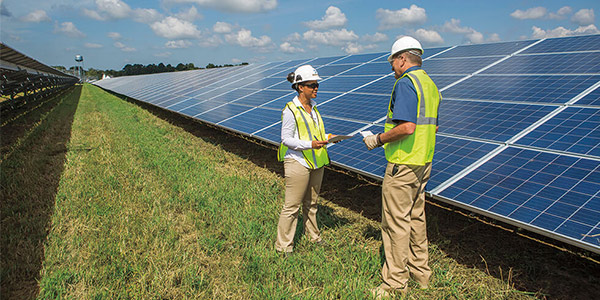Virginia regulators have graded Dominion Energy’s proposed integrated resource plan as incomplete, saying the company must provide more information on how it will comply with the Virginia Clean Economy Act (VCEA) approved by lawmakers last year.
Dominion Energy Virginia filed the 2020 IRP on May 1, little more than two weeks after Gov. Ralph Northam signed the act into law. (See Va. 1st Southern State with 100% Clean Energy Target.)
The law requires Dominion to:
- retire all carbon-emitting electric generation plants by the end of 2045;
- participate in a renewable energy portfolio standard (RPS) program; and
- seek commission approval by the end of 2035 to construct or acquire 16.1 GW of solar and onshore wind, 5.2 GW of offshore wind and 2.7 GW of energy storage.
Dominion Energy Virginia, which owns 27,100 MW of generation, has proposed building 2.6 GW of wind generation off the coast of Virginia and is about halfway through a plan to add 3,000 MW of solar generation. Its proposed IRP for 2021-2045 would quadruple the amount of solar and wind generation in its previous 15-year plan. (See Dominion Undecided on FRR Option.)
But that didn’t go far enough, the State Corporation Commission said in an order Monday (PUR-2020-00035).
“The commission recognizes that Dominion did not have an extended opportunity to conform its 2020 IRP to address all the interrelated aspects of recent legislation. The commission, however, cannot conclude, based on the record in this proceeding … that Dominion’s 2020 IRP, as filed, is reasonable and in the public interest for purposes of a planning document,” it said.
More Detail in Updates
The commission said the utility’s 2021 and 2022 updates to the plan must improve the modeling of alternative plans for complying with the VCEA and explain how its plan will address environmental justice issues.
The 2020 plan included four alternatives for complying with the act, but commission staff and other commenters challenged the company’s modeling and the reasonableness of the results. “With few exceptions, Dominion’s VCEA plans are substantially similar and do not model multiple paths to compliance with the VCEA,” the commission said.
It said Dominion would “substantially overbuild” the capacity it needs to meet peak load and energy requirements. One of the plans included capacity in excess of projected load of 1,800 MW in 2027, rising to 7,400 MW by 2045.
The VCEA plans also produced more renewable energy credits (RECs) than required by the RPS program. “Dominion’s modeling of the VCEA’s RPS Program requirements did not consider monetizing or banking excess RECs or model the RPS Program deficiency payments.”
Dominion did not update its forecasts of future energy, capacity and fuel prices to reflect the passage of the act, regulators said.
Several commenters, including Appalachian Voices and the Sierra Club, criticized the plan for modeling 970 MW of new natural gas-fired combustion turbines to be added between 2023 and 2024 in all VCEA plans. The company said the resources were “placeholders” to address potential reliability problems from the addition of large amounts of intermittent generation. “In the future, the company should also include one or more plans without such ‘placeholder’ additions to address reliability concerns for comparison purposes and to improve transparency in the company’s planning processes,” the commission said.
Appalachian Voices and the Natural Resources Defense Fund also criticized Dominion for not modeling any energy efficiency targets after 2025. The VCEA set EE targets through 2025 and directed the commission to set targets after that date. “The commission has not yet set the post-2025 energy efficiency targets,” regulators said. “We agree, however, that assuming those targets would be zero after 2025 was unreasonable and direct the company to continue to model energy efficiency targets after 2025.”
Staff, the Attorney General’s Division of Consumer Counsel and other commenters also faulted Dominion for not including a least-cost VCEA compliant plan.
Glen Besa, retired director of the Virginia chapter of the Sierra Club, took issue with Dominion’s inclusion of a 300-MW pumped storage facility, which he contends is uneconomic, while staff said the company included a second tranche of offshore wind not mandated by the act.
Environmental Justice, Bill Impacts
The commission noted that the 2020 plan was the first in which Dominion was expected to address environmental justice in its long-term planning. “In addition to addressing environmental justice in more specific contexts, such as requests for certificates of public convenience and necessity for particular facilities at known locations, the commission finds that the company should address environmental justice in future IRPs and updates, as appropriate,” it said. “As one example, the company may consider the impact of unit retirement decisions on environmental justice communities or fenceline communities.”
Regulators were also skeptical of Dominion’s analysis of its plan on customer bills. The company projected residential bills would increase by $52.40 and $55.02 per month by 2030. Commission staff said the utility understates likely increases because it projects that it will recover a declining percentage of its costs from the residential class over the next decade. Based on current allocation factors, staff estimated bills would rise by $64.27 to $67.32 monthly based on the company’s compliance with the act.
Commissioner Angela L. Navarro, who was appointed in December and confirmed last week, did not participate in the order.
Dominion spokesman Rayhan Daudani said the company “will carefully review the commission’s order and incorporate its direction in our next IRP filing. We appreciate the commission’s acknowledgement of the vital role electric reliability plays and look forward to working with our regulator to make our strong record of reliability even better.”
Commenters will have a chance to discuss the IRP on Feb. 12, when the commission will hold a public hearing at 10 a.m. on Dominion’s RPS plan (PUR-2020-00134). The deadline for registering to speak is Feb. 10.





